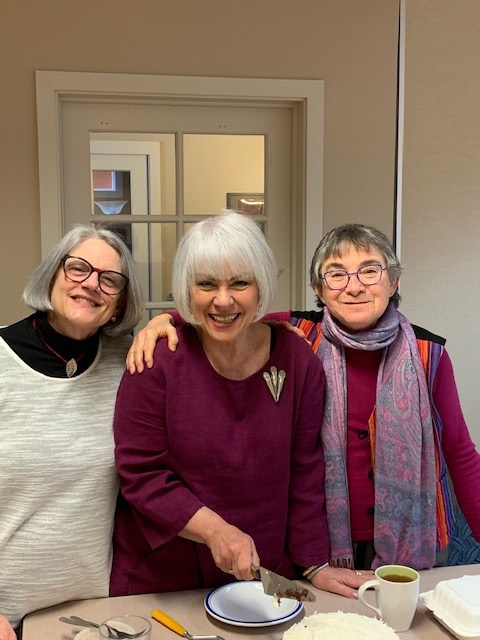Cancer Lifeline Volunteer Nancy Werner (center) cuts the cake with former staffer, Mary Ellen Shands and Cancer Lifeline Community Program Manager, Basha Brownstein when the gang was finally reunited at the Dorothy O’Brien Center in April 2022.
When I was diagnosed with cancer, I had never been healthier, more fit, or happier in my career. No one plans to get cancer, but the shock of my diagnosis was overwhelming. I had Breast Cancer! I was too “young.” There was no breast cancer in my family. I always thought other people got cancer.
I was terrified. How was I going to tell my husband and my son? How would I go through treatment and the side effects? How would I cope with the physical transformation that was about to hit me like a ton of bricks?
I feared we would lose our house, the bills would never get paid, and my beautiful garden would shrivel up and turn to straw. It was suggested by a volunteer at the hospital that I investigate Cancer Lifeline and how they might help me cope. I wasn’t a complete stranger to support groups in other areas of my life. I knew they had merit. She also referred me to a counselor there who walked me through the process of dealing with my fear and my husband. By seeking support, and sharing all those fears none of that happened. In fact, it was my family, and my garden, that kept me going.
My husband’s fear and grief were invisible to most, but I knew they were enormous. I asked him to join my journey. As a professional photographer he found that a way to get through this ordeal was photographing my cancer experience. I also took him to almost every doctor’s appointment and introduced him to all my practitioners. He knew what I knew, heard what I heard. The support group taught me that too! Don’t go through this alone, they said.
The team at Cancer Lifeline was extraordinary. They helped me through every stage. The fear of losing everything was transformed into a series of day-to-day solutions to each challenge. I learned to be a better patient. My support system empowered me to go on. The group made me laugh and even taught me tricks to tolerate treatment. I was amazed at how everyone that cared for me had become a network, a family of sorts.
Cancer touches everyone. When I recovered, I felt a powerful urge to get involved. I wasn’t sure how. Years later, I heard two of the Cancer Lifeline staff speak at a trade luncheon about how Cancer Lifeline supports all people living with cancer. I knew I had to do something.
Today as a survivor, and now a Cancer Lifeline volunteer, I take calls from people who are as overwhelmed as I was, who are scared of losing their lives, being too sick to work or care for their family, who will lose their beauty, and possibly their homes.
I hear their voices and I know that no matter how dark it seems for them at the moment, I can give them hope and support like someone did for me. Sometimes something as simple as a kind voice or help with a support group registration brings a bit of joy to our callers.
I look forward to my work there. It is a perfect way to get “out of myself” and give back to those who helped me through. As a mother, a wife, a business owner and a cancer survivor, the one thing that I know for sure is that the only thing worse than having cancer, is having cancer alone

